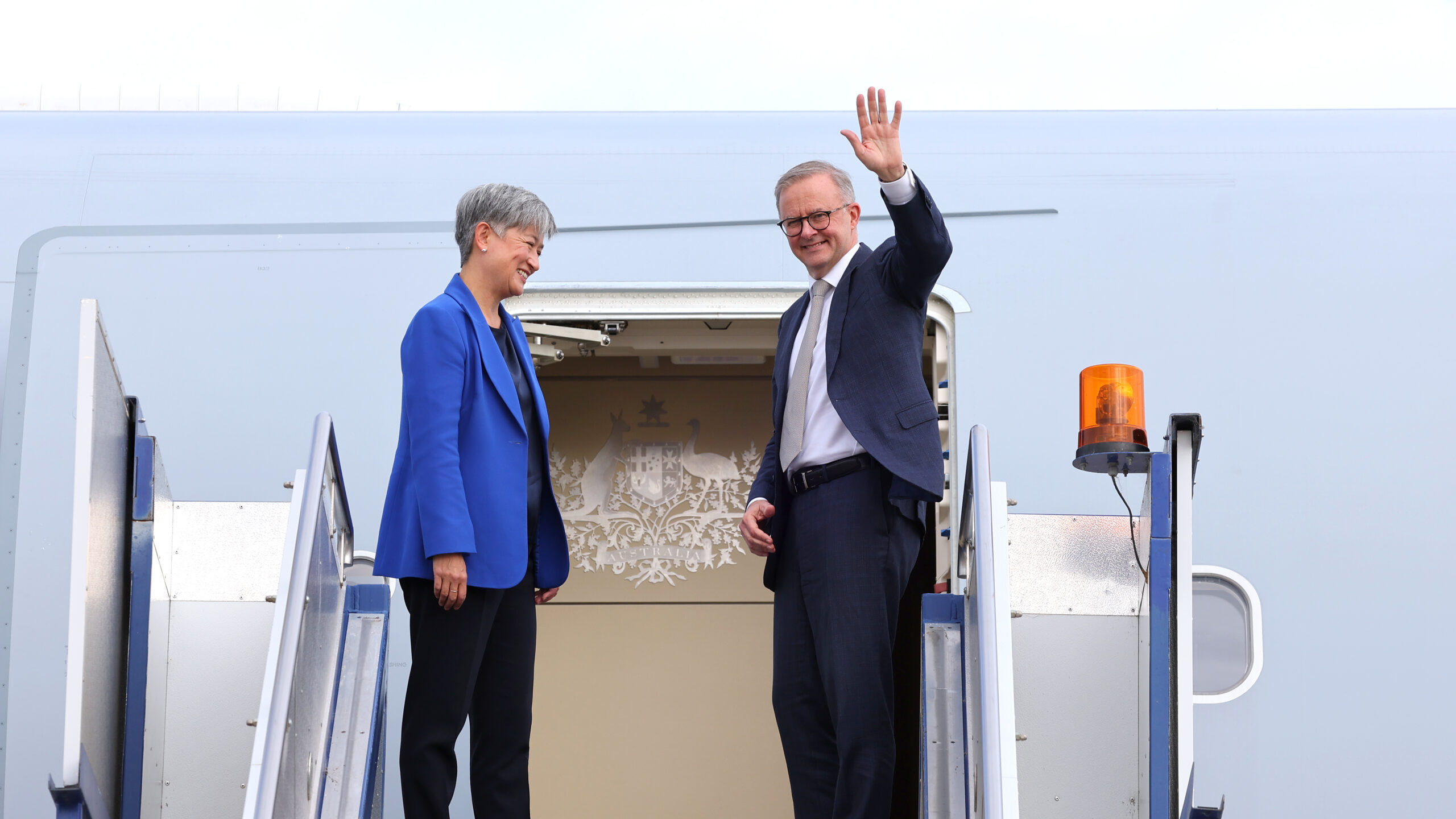
Prime Minister Anthony Albanese stands with newly appointed Foreign Minister Penny Wong, at the door of their plane on May 23, 2022 in Canberra, Australia. (David Gray/Getty Images)
CORRECTION 5/24/22 at 9:22 am EST: The original story mislabeled Peter Dutton’s party affiliation and has been updated.
SYDNEY: After the Labor party’s historic win in Australia’s federal elections, excited political observers are combing over exactly how many “Teals” won seats in Australia’s parliament and how close Labor is to getting the minimum 76 seats for a majority.
But the topic of “defense” hasn’t come up all that much — likely as a result of a consensus that there will be only marginal shifts for the new government on the national security front.
So far, it’s unclear who the defense minister will be. There have been rumors that former trade minister and shadow defense minister Richard Marles would be the likely candidate. Marles was sworn in as deputy prime minister and, per the BBC, employment minister earlier today, but could potentially switch the latter job for the defense gig depending on how things shake out.
It is also unclear whether the Green Party, who are left of the victorious Australian Labor Party, will be part of government, which could have an impact on the kind of defense spending new Prime Minister Anthony Albanese can pursue.
What is clear is that the Labor Party and Albanese are fully committed to the AUKUS defense agreement and its nuclear attack submarines, support a staunch stance towards China and will engage in a department-wide scrub known as a Force Posture Review.
Albanese, who rushed from his swearing in to the Quad summit in Japan today, took pains to tout his relationship with US President Joe Biden: “I received a phone call last night and had a very fruitful and positive conversation, renewing my acquaintance with President Biden,” he said. “The relationship with the United States is our most important, along with our relationships in the region and our multilateral commitments as well.”
At his swearing in by Queen Elizabeth’s representative, the Governor General of Australia, Albanese was asked about China, which has engaged in election interference, slapped an embargo on many Australian goods and publicly berated Australia. China is also Australia’s largest trading partner.
“What I have said, and we maintain, is that the relationship with China will remain a difficult one. I said that before the election. That has not changed. It is China that has changed, not Australia. And Australia should always stand up for our values,” he said. “What I will do as the Prime Minister, and my Foreign Minister, Senator [Penny] Wong will do, is put Australia’s national interests first, put Australia’s values first.”
The bottom line, according to several observers here as well as the campaign rhetoric, is that relatively little fundamental change to defense policy or spending is likely.
“You couldn’t slide a knife blade between the two parties’ policies,” said Marcus Hellyer, a defense policy and budget expert at the Australian Strategic Policy Institute, a think tank largely funded by the government but known for its independence.
Asked what he would tell an American diplomat about the election, he said Labor is completely committed to the ANZUS Alliance between Australia, New Zealand and the US, as well as the AUKUS agreement. Hellyer added that the force structure review — which is a step below a White Paper — probably won’t end up recommending many significant changes if it follows precedent.
As to the potential new defense minister, the veteran Australian defense reporter Kym Bergman described Marles as having “previously distinguished himself as having something of a low energy approach and will happily take Departmental advice on just about everything rather than rock the boat and attempt reforms — which the procurement part of the organisation desperately needs with billions of dollars being wasted on various misguided acquisitions.”
Continued Bergman: “the best choice for Labor would be to stick with Brendan O’Connor who has performed well in recent months — particularly during the election campaign debate at the National Press Club with his counterpart [then-Defense Minister] Peter Dutton. O’Connor came across as thoughtful with a detailed knowledge of the portfolio — and he refused to be baited by the frankly childish insults directed at him and his colleagues. He also presented as a decent human being — something of a rare and valuable quality in Federal politics these days.”
Hellyer agreed that Labor members rarely come in with a great deal of defense knowledge and can be “dazzled by all the gold braid and generals.”
Regardless of who is the minister in charge of the department, Labor does not come to government with a vigorous mandate. A record number of Australians didn’t vote on May 21 for either Labor or the defeated Liberal Party; they voted for the Greens or the independent members of Parliament who have come to be known as Teals, all of whom are women in suburban districts.
One thing that is clear, however, is that outgoing Prime Minister Scott Morrison and his Liberal party were crushed. Their coalition government held 76 seats before the election; they are down to 50, give or take a few where votes are still being counted.
That may leave the Greens, who took seats from Labor as its traditional supporters seemed to want more than their party, in an intriguing position if Labor doesn’t secure 76 seats on its own. That’s hard to predict today, though observers are increasingly confident Labor will get there.
Per the BBC, Peter Dutton, the most recent defense minister, is a likely candidate to become the Liberal part leader. Dutton, a hawkish voice, has been viewed as angling for that job for months.






















